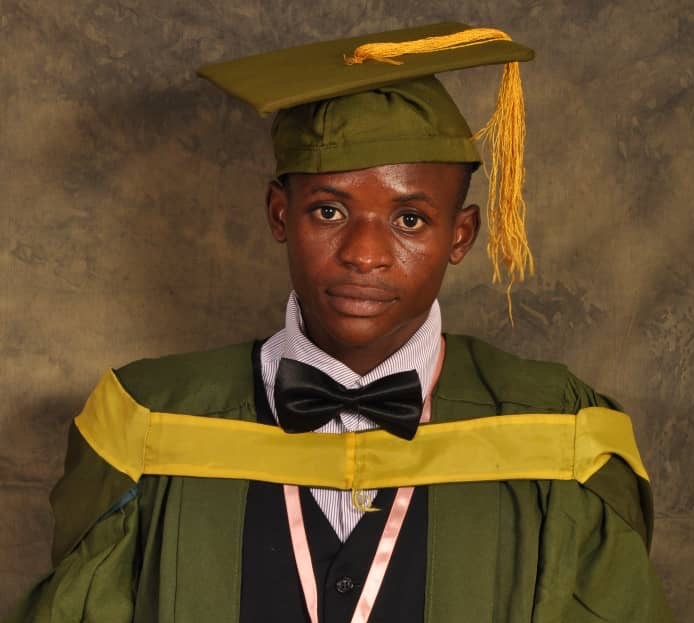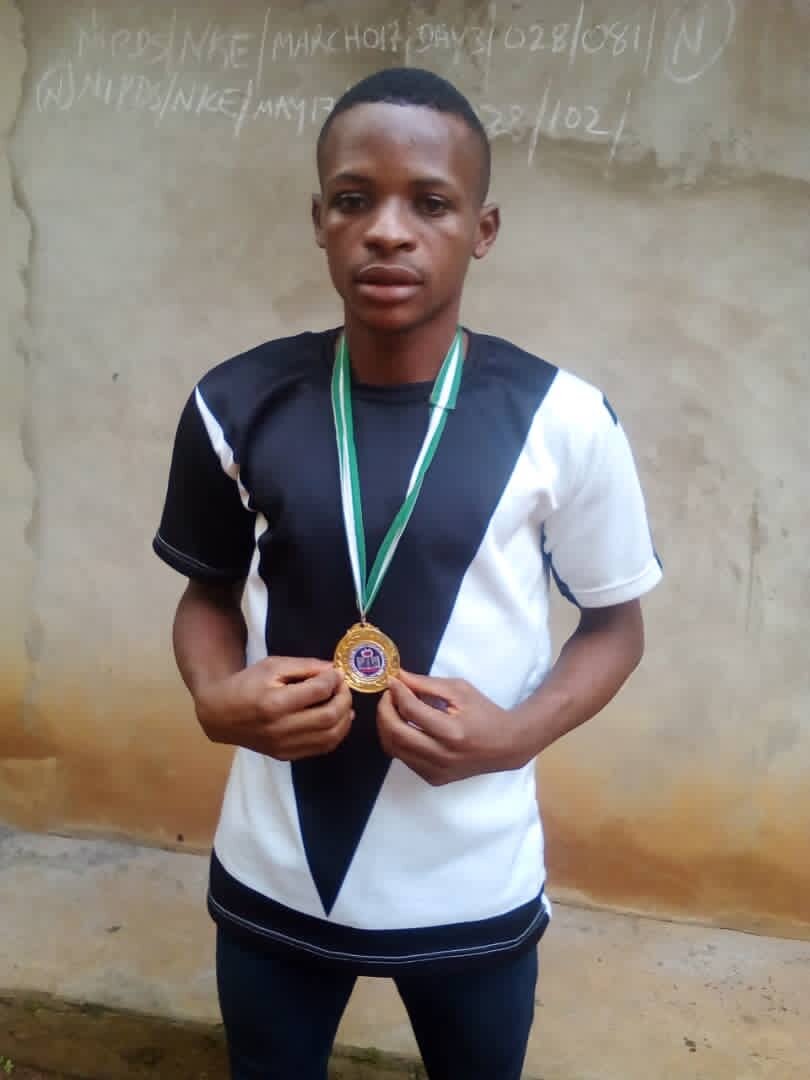UPDATE on November 21, 2020: The viral article below was originally published on November 8, 2020, a few days after the Michael Taiwo Scholarship team interviewed Emmanuel Nworie. As can be seen in the article, it was clear to us (MT Scholarship Team) that he needed all the help he could get, and we started working with him right away. We provided ALL the financial and mentoring assistance he would need to secure a fully funded PhD program in one of the best schools in the United States. We did all these BEFORE the world knew about him.
The only reason we went public with the story was so that we could start a national dialogue on how we are failing our top talents. The intention was not so that people could feel sorry for Emmanuel or ask for his phone number in a bid to help. The Michael Taiwo Scholarship team has already helped him. Emmanuel is fine now; he is no longer “languishing on an Ebonyi farm” or “wasting away” as some sensational headlines have mischaracterized his current situation. His life changed the day he showed up for our interview because the next day we began delivering the help he needed. We have the financial ability and the professional network needed to help people like him. But there are many others like him whom we haven’t found, and that is sad, so the earlier we start directing our efforts towards helping those, the better for all of us. – Michael Taiwo, PhD
We are currently interviewing the top 25 out of over 1,500 applicants for this year’s MT Scholarships. This is our second year of doing this, and so far, I have been part of every panel interview for the finalists. I’m usually detached from most interviews. I ask questions, make an evaluation, wish them well, move on. Then came Emmanuel Nworie from Ebonyi State, Nigeria.
Emmanuel completed secondary school at the young age of 15; he skipped some grades because of his brilliance. He aced his WAEC and JAMB – the two customary standard exams Nigerian high schoolers write to secure a university admission. He could have finished college at 19 or 20 and moved on to bigger and better things but life had a different plan[i].
Emmanuel, born in December 1992, is the second of eight children. His dad taught Mathematics at a public primary school; his mom was home to take care of their expanding family. Their life changed in 2005 when Dad was diagnosed with diabetes and hypertension. First, he left his job due to failing health, then he lost his savings to pay physicians, and went into debt to stay alive but on a cold harmattan morning on January 29, 2009, he lost his life.
Emmanuel (2nd from right) with his mom (center, front) and four of his seven siblings; their house is in the background.
The loss of the breadwinner in the Nworie household is a setback they are yet to recover from. It stopped Emmanuel from progressing to college. He took a job teaching Mathematics to grades 7, 8, 9, 10, 11 & 12 at the secondary school he finished from where he had the honor of being awarded the Best Mathematics Olympiad teacher in the State. His salary was $33.33 per month[ii]. “I was just grateful they paid me regularly,” he told me, “I am happy that I made the kids like Math.” He would stay at this job for five years.
Emmanuel lives with his mom and seven siblings in a house that is not hooked to the electric grid, doesn’t have indoor plumbing, has no address, and you need to walk a mile from it to get cellular coverage. Widowed, his mom took to cultivating cassava on the land their dad left behind. She also farms other people’s lands for a return of some of the harvest. It’s the type of arrangement only people without options take.
After five years of saving some of his $400/year teaching job, he cobbled together enough funds to attend a nearby polytechnic (university was too expensive) to study Statistics. For his one-year internship after his polytechnic studies, he took a teaching job at a different secondary school because “the pay was better.” He was paid $45.20 a month. But that was enough to pay for his admission into the prestigious University of Nigeria, Nsukka.
Eight years after leaving secondary school, he finally got into his dream college to study his favorite subject – Mathematics. He graduated as the best student in the Department of Mathematics (and in the Faculty of Physical Sciences) with a cumulative grade point average of 4.92/5.00. I checked his transcripts, he would have finished with a 5.00/5.00 but in his first year, he got a “D” in “Use of English.” You can tell he went to a subpar primary and secondary school. His command of English is not at the level of his other intelligences.
Graduation picture. His GPA put him in the top two of all graduating students in the University of Nigeria, Nsukka for the 2017/2018 academic session. He was the best student in both the Department of Mathematics and the Faculty of Physical Sciences.
In his final year, he won the GOLD medal in the University category of the 2018 National Mathematics Competition. I happen to have participated in the Primary Six (Grade 6) and JSS 3 (Grade 9) categories of the same competition. I only made it to the State level. For Emmanuel to have qualified for the national level at the University category and bagged the GOLD medal tells me he is a math genius.
Posing with his Gold Medal from the 2018 National Mathematics Competition.
And what is our math genius doing right now? He is farming, as in, hoe and cutlass farming in a village in Ebonyi State. He completed his one-year National Service as a teacher in a secondary school in Enugu city, Enugu State. After this, he was retained to teach Advanced Mathematics at the school for $77.46 per month. When lockdowns due to COVID-19 hit, he left this job to go back home to help with farm work. The lockdown was lifted weeks ago, and so he returned to the city to teach. This was where he learnt about the MT Scholarships and decided to apply.
“If the restrictions were still in place,” he told me, “there is no way I would have known about this from my house in Ebonyi.” One of the interviewers, who has also detailed his impressions in these tweets, asked: so how else would you have covered the cost of applying to graduate schools? “I have calculated that it would take me 6 to 7 years to save for this[iii].” I didn’t – couldn’t – say this then but I wanted to scream, “No sir! Not on my watch. You won’t wait 6 to 7 years for your chance. You have been punished enough.”

Harvesting cassava at the family farm during COVID-19 lockdown. He left weeks ago to teach Math at a school but will be back here during school breaks or if lockdowns were reinstated.
And punished for what exactly? For the “crime” of being born at the wrong place at the wrong time. There was a time in Nigeria a prodigy like him would have been calling the shots, regardless of his family circumstances. In many other parts of the world today, he would be pushing the boundaries of science, adding to the commonwealth of knowledge, exploring what is possible, preaching the beauty of Math. But alas, he was born poor in Nigeria.

Helping his mom to process cassava into garri, a Nigerian staple food.
Since my initial encounter with him, I have felt rage and sadness, but I have also felt gratitude and hope. Rage at a system that weaves a thousand tentacles to trap people in poverty, unable to move up or out. Sadness at the widespread nature of the problem. Gratitude that one at a time, this wrong is being redressed. And hope in the belief that no force of hell can stop an idea whose time has come; hope in the indomitability of the human soul. Emmanuel, for instance, has been dealt a bad hand, but he is not bitter, nor does he feel sorry for himself. He smiles a lot, shy, humble, but you cannot mistake the genius, the steely resolve to make it in a world determined to crush him. I feel fortunate that our paths crossed.
We are about to wrap up the interviews for this year’s application round. The finalists are the crème de la crème of Nigeria. Many of them were the best graduating student in their department, faculty or university. Some have perfect GRE scores; others have published papers; a few have nationally and internationally recognized awards. And some of them, like Emmanuel Nworie, did all this while being dirt poor. I am thankful that this forum exists to invest in their stories.
– Michael Taiwo, PhD
[i] I had a follow-up interview with Emmanuel for this article. The details here were pieced together from my two meetings with him.
[ii] Throughout this article I use the dollar equivalent at the time in question.
[iii] The cost of applying to US graduate schools is about $1,000; this puts it effectively beyond the reach of indigent students. If you want to support the work we are doing, you can donate here. Every little bit helps. Thank you.





